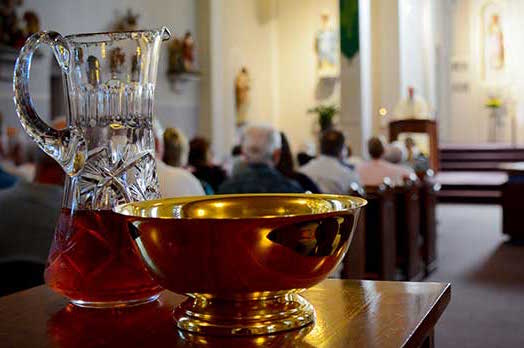The Real Presence of Jesus Christ in the Eucharist
Note: This is the fifth in a five-part series on the Real Presence of Jesus Christ in the Eucharist.
The very simplest answer to the question of the what the Eucharist accomplishes in our souls: it makes us more charitable.
It makes sense, really — when we become one with what was the ultimate sacrifice, the principal effect is an increase in the virtue of charity and the ability to give of ourselves.
“The Mass extends through time and space the sacrifice of the Cross, where Christ manifests the depths of his love,” said Fr. Jacob Strand, pastor of Holy Trinity and St. Michael parishes in Kewaskum. “Through the Sacrament of the Eucharist, Christ lets us experience his perfect charity, his unconditional love, which in turn inspires us to give of ourselves more generously.”
“This increase in the virtue of charity places us in right relationship with God and it also stimulates the will to perform acts of charity more frequently and fervently,” said Fr. Stephen Buting, associate pastor of Lumen Christi Parish in Mequon. “Because it is the sacrament of charity and because it is the source and summit of Christian life, there are so many other effects of it, but that is the primary effect.”
It was St. Maximilian Kolbe who said “if angels could be jealous of men, they would be so for one reason: Holy Communion.” Essentially, when we have just received the Body of Christ, we become a living tabernacle. It is easy to get distracted by the commotion at Mass, and often there is even the temptation to duck out the back door and get on with our busy weekend — but as much as possible, we should savor those moments where we are literally touching God.
“The Sacramental presence endures for about 10 to 15 minutes after we receive, before the accidents of bread and wine are fully broken down,” said Fr. Michael-Joseph Paris, OCD, a Carmelite priest who serves at the Basilica and National Shrine of Mary Help of Christians at Holy Hill. “It is such a beautiful time to stay with Christ, and sit at his feet like St. Mary Magdalene. Or to ‘take off our shoes,’ so to speak, like Moses in wonder before the burning bush. If we have him so near to us, even bodily, why would we want to run off right away to get on with our day?”
“It’s not merely in a spiritual sense that God is present to us immediately after we receive the Eucharist,” said Fr. Andrew Linn, associate pastor of St. Mary and St. Anthony parishes in Menomonee Falls. “He is physically dwelling in our stomachs. As you pray, you’re not speaking to someone outside yourself, but rather to someone who is within you, with whom you are perfectly united. That moment is an even greater moment than adoring our Lord exposed on the altar. He’s not right in front of you. He’s actually inside of you.”
When we receive the Eucharist, we also find ourselves transported spiritually to the foot of the Cross.
“Every priest who celebrates Holy Mass, together with the Christian community which takes part in it, is led back in spirit to that place and that hour … the hour of the redemption of the world,” wrote John Paul II in his encyclical, Ecclesia de Eucharistia.
Surely we have all heard the assertion that it is useless to be a Christian in modern times, and to look to someone who lived 2,000 years ago for any kind of relevant moral direction. But to study the Eucharist is to understand that this is an argument without teeth, for as Catholics, we do not believe in something that happened, but in something that is happening over and over again before our eyes. The Eucharist is the re-created sacrifice on Calvary, and it occurs every day, on every altar the whole world over.
Herein lies the real value of a solid understanding of this mystery of faith. To understand that mystery truly is to be in love with the Eucharist. To be in love with the Eucharist is to have a profound need for the sacrifice of the Mass. To have a need for the Mass is to be, always and forever, in union with the Bride of Christ, the Holy Catholic Church.

